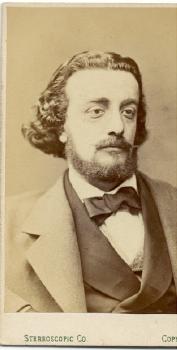 |
 |
from Il Trovatore, 20 January 1870 and 22 January 1898 (the latter his obituary, see below)
|
... The audience warmly applauded Nicolini in phrases of the first act (of Faust) and called him in front of the curtain with the basso Petit. During the third act, the romance aroused great enthusiasm. His manner of modulating his voice, of emphasizing the value of a phrase, coloring his singing, and of binding his sound so that the melody is completely outlined, produced a marvelous effect on the audience, which manifested itself by deafening and unanimous applause that greeted the distinguished tenor. After the magnificent piece "Notte d'amor", he received many bravos and also at the end of the trio of act IV. Il Trovatore, 24 November 1870 |
|
The announcement of his death did not arrive unexpectedly, since the notice that we received recently foresaw the event. He died at 64 years. Ernesto Nicolini began his career in Italy during the carnival season of 1860, at La Scala (under the name Nicolas), when there were a dozen of tenors on the roster. Nevertheless, despite his pronunciation and his French method of singing, he was received favorably by the public, thanks to a pleasant voice, his tone and the passion with which he sang. He appeared first in La traviata, and then in Lombardi and a new opera by Giorza, "Corrado, console di Milano", that turned out to be a fiasco. It was his success that brought Nicolas back to la Scala, four more times; that is during the autumn of the same year, singing La sonnambula; then in spring 1862, singing in Lucia; and finally, with Patti, during the autumn of 1877 and the carnival season of 1878, singing in Traviata, Faust, Barbiere, Sonnambula and Aida. What a precious artist, what a tenor phenomenon, with his dramatic tenor voice, capable of singing both Sonnambula and Barbiere. In Aida, none of the many celebrated tenors of that time have proved successful to surpass, and not even equal his singing of the phrase "Io son disonorato" that he declaimed with such torment as to make the listeners tremble. The favorable 1860 reception at La Scala in Traviata opened him the doors of the major opera houses, which brought him large salaries. He sang in all the major foreign theaters: in Madrid, Barcelona, Lisbon, St. Petersburg, London, where he became enamored with Patti, and vice versa. This falling in love brought a legal separation from the Marquis of Caux, then the divorce between Patti and the Marquis of Caux. When Caux died, Nicolini married Patti. Il Trovatore, 22 January 1898
|